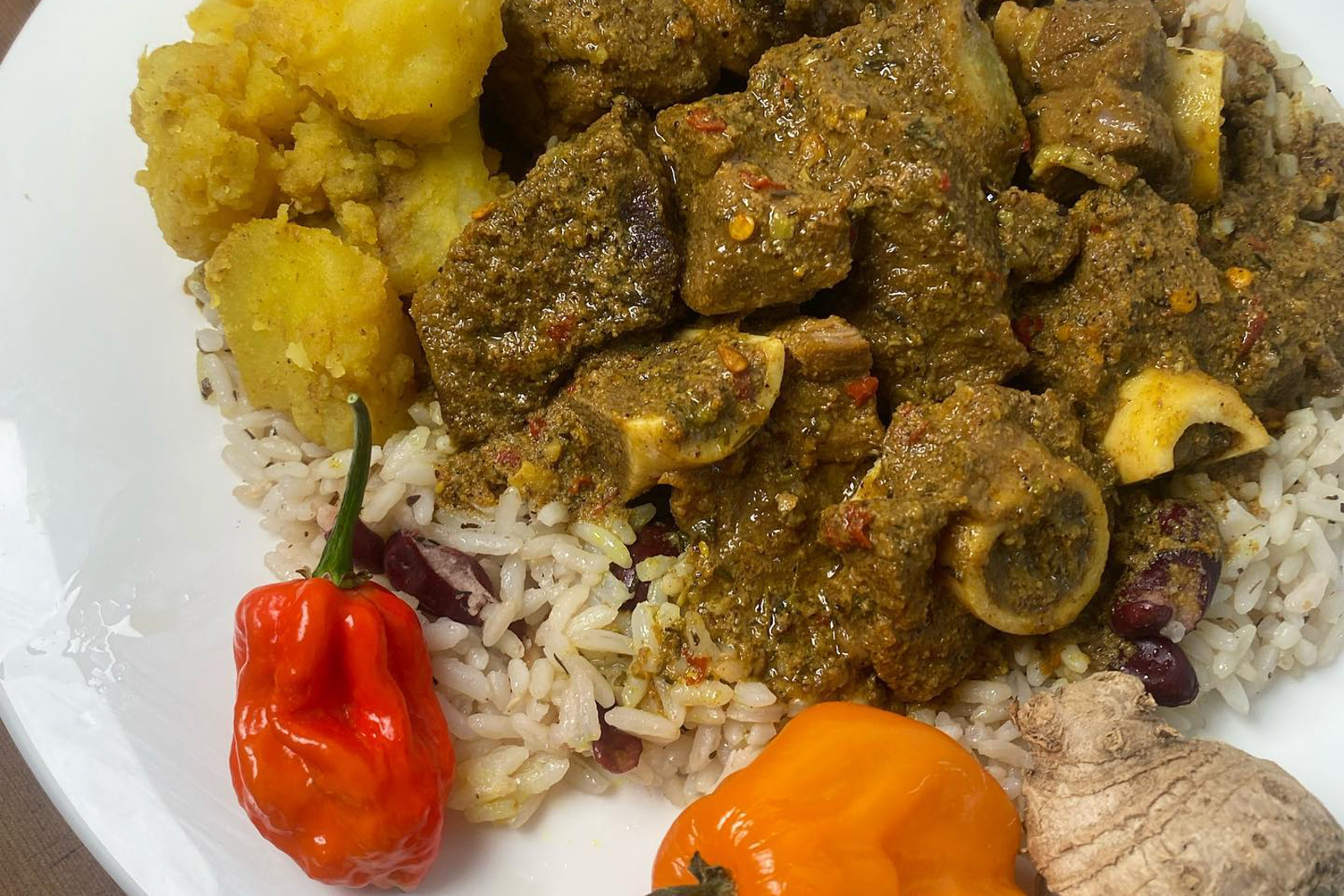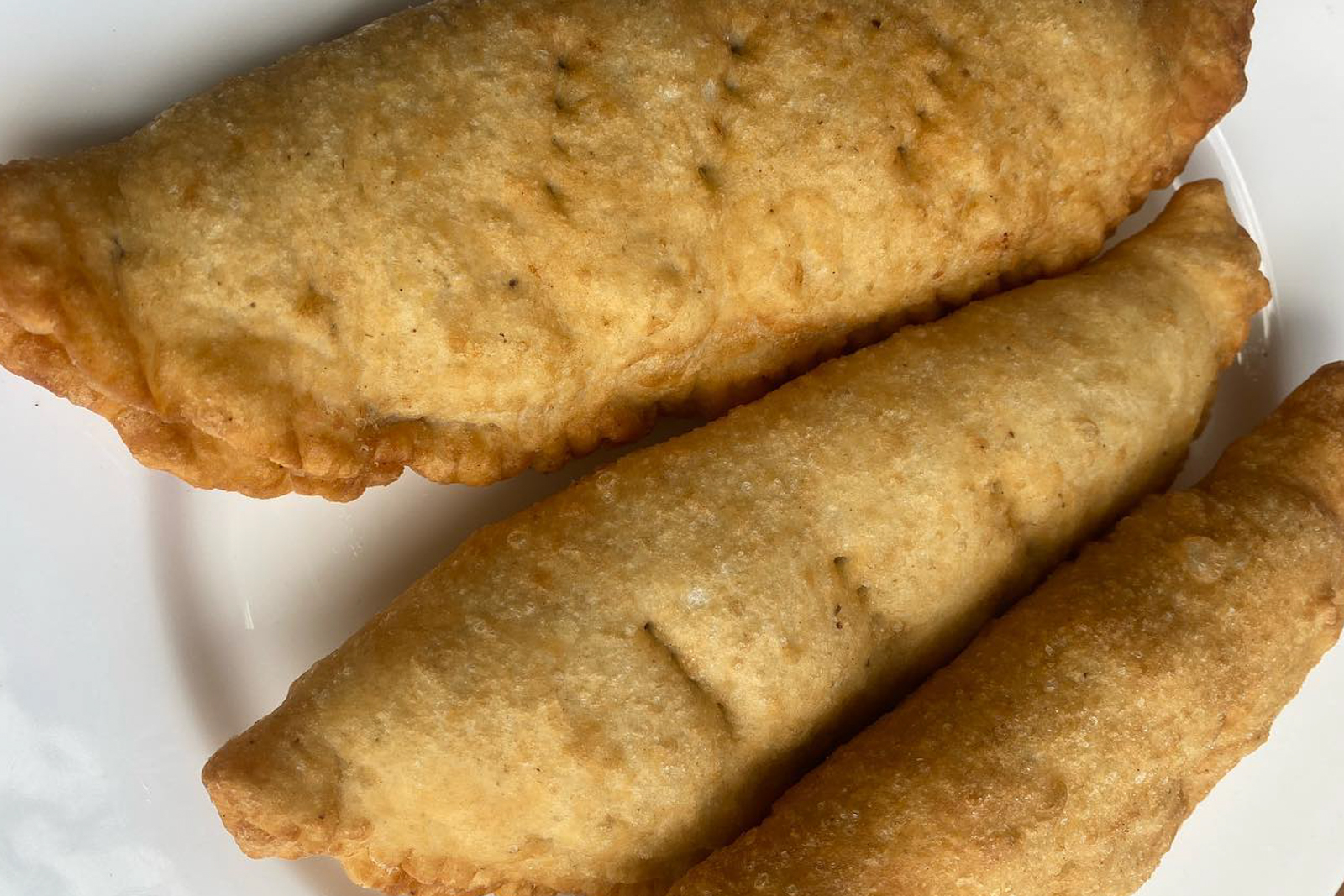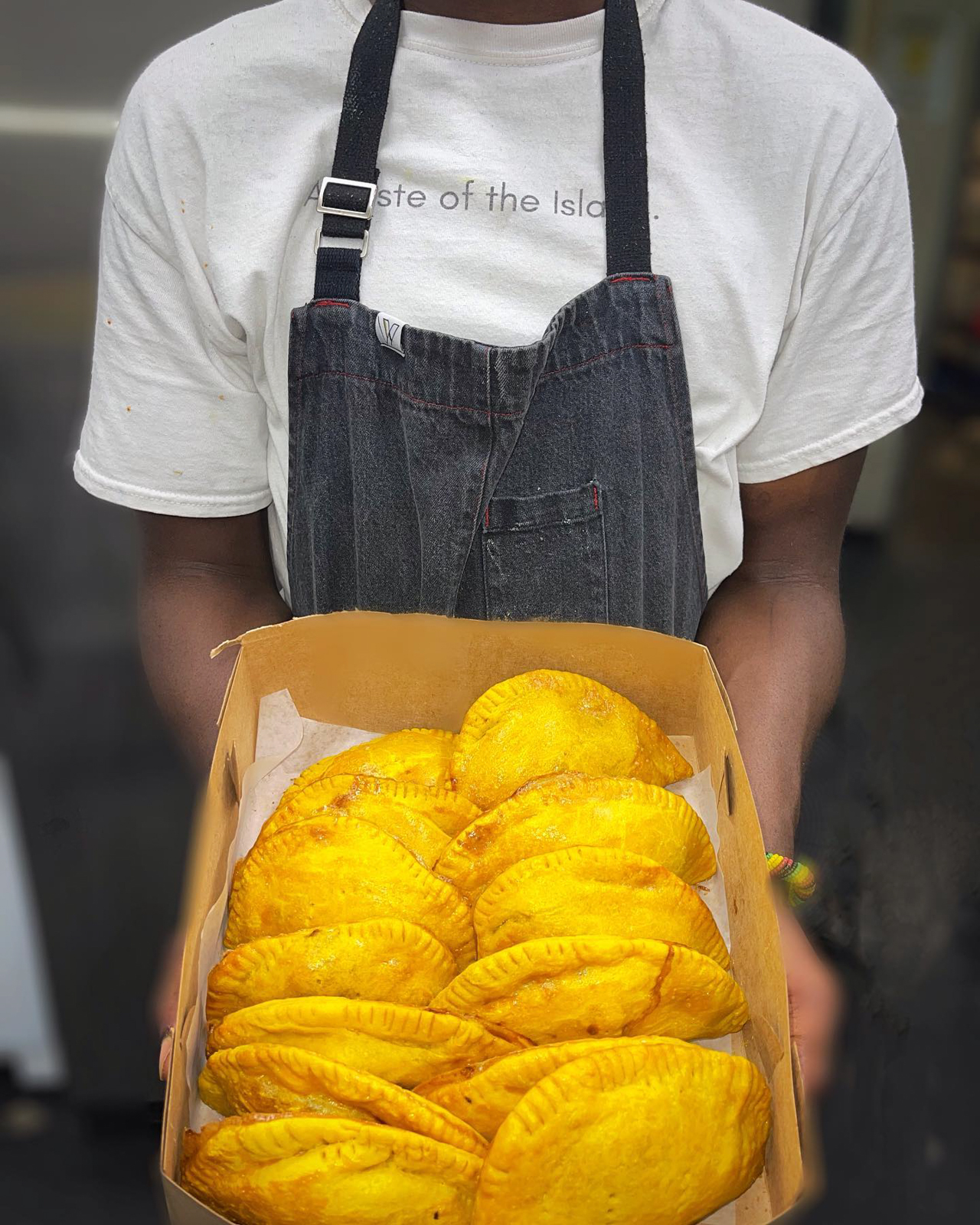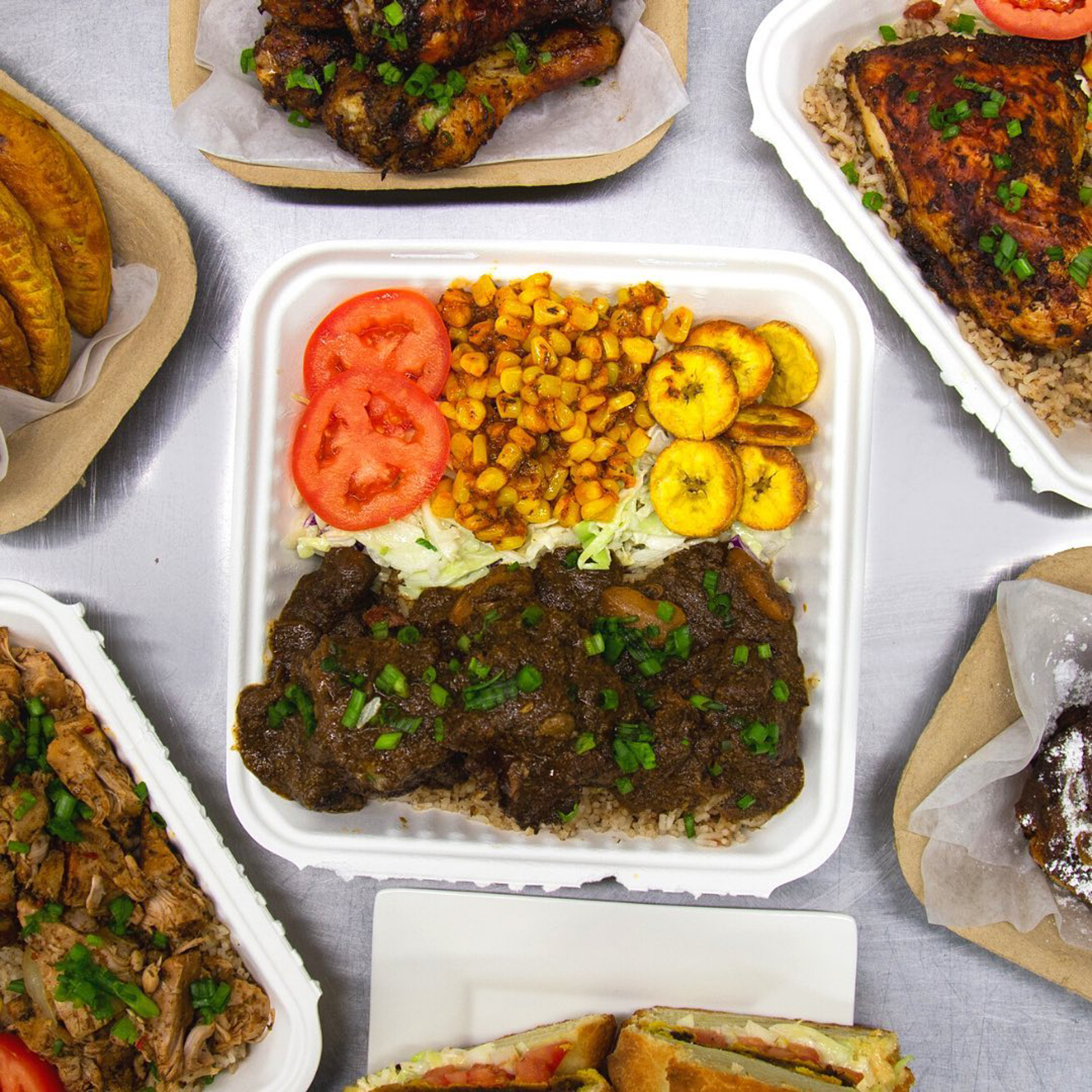Roy Hinkson points to the expansive mural on the wall of his Trinidadian restaurant, naming the joyful faces one by one: Mighty Sparrow, Lord Kitchener, Calypso Rose. These Trinidadian calypso giants laid down the roots of other styles of Caribbean music such as Soca and reggae. “These three paved the way for Marley,” Hinkson says.
The mural is a nod to Hinkson’s other career as a DJ but also to the Caribbean culture and community that inspired him and co-owner Dana Mohammed to open Baby Dhal Roti Shop in 2021. Their establishment tells a story about the resilience and expansion of the Lower Mainland’s Caribbean food scene. “It’s really important for us to carry on the Caribbean lineage that happened here,” Mohammed says. Baby Dhal took over the space formerly occupied by Jamaican Pizza Jerk, run for over two decades by Horace Hunter, a beloved figure known as Chef Bounty, who passed away in 2020.
Mohammed and Hinkson pay tribute to many long-running Caribbean restaurants, such as Rehannah’s Roti and Trinidadian in Port Moody, The Lion’s Den Café, Riddim and Spice, and D Roti Shak, owned by Mohammed’s father in New Westminster. Hinkson met Mohammed at the family restaurant when she was overseeing operations during the pandemic. Hinkson, who is half Trinidadian, grew up eating his mother’s Italian cooking and had little exposure to the other side of his heritage. He developed an interest in the cuisine after a trip to Trinidad with his father. “My relationship with the food was a fascination with a side of myself that I didn’t really know,” he says. His explorations of his identity involved visiting Caribbean restaurants, getting to know the cuisine, and chatting with owners, such as Mohammed’s dad, about their experiences.

Curry at Baby Dahl.
Mohammed grew up eating her mother’s roti and her father’s flavourful Trinidadian curries. When she started cooking, she combined their teachings. “I got my mother’s stamp of approval. My sister was blown away when she had my oxtail. ‘You made this?’”
Hinkson was so impressed by Mohammed’s cuisine that the two started brainstorming their own business. At first, they were going to sell roti through a commissary kitchen, but when the space on Commercial Drive became available, they decided to open a brick-and-mortar location.
One goal for Baby Dhal was to bolster Vancouver’s Caribbean food landscape, which Hinkson says has struggled. “Restaurants would peter out. And the ones that did last ended up going fusion or found some way to adapt to the environment that we are in.” He theorizes that it’s hard to develop a loyal following because the community is spread out. And diners have been hesitant to trust that a restaurant will last.
Mohammed also thinks the nature of the cuisine is a barrier for many potential restaurateurs. Her oxtail, for example, features eight spices and requires a multi-stage process of searing, sautéing, and then slow cooking for nearly three hours. “It’s very laborious food. The restaurants that are open are the OGs, and they’re all ready to retire.” She is grateful for the cultural knowledge passed down to her, a responsibility she doesn’t take lightly.
While she and Hinkson understand why some restaurants have tailored their dishes to local palates, they wanted a menu that was unapologetically Trinidadian. Baby Dahl serves a variety of curries, such as goat and shrimp, as well as chicken and oxtail stews and street food such as doubles (chickpeas sandwiched between fried flatbread), aloo pie (fried potato pie), and pholourie (fried balls of dough). “This 80-year-old man drove all the way from Richmond. He took a bite and said, ‘I feel like I’m back in Trinidad,’” Mohammed recounts.
Part of the work at Baby Dhal is educating customers who are unfamiliar with the food. The nuances of Trinidadian cuisine can get lost under one big Caribbean umbrella, such as when customers ask for jerk chicken or Jamaican patties. Mohammed explains in detail to staff and customers the two types of roti they offer: buss up shut, which is flaky and torn up; and dhal puri, a wrap with dough filled with ground split peas and rolled thin. “It gets to be tiring because you’re saying the same thing over and over again, but you’re putting knowledge out in the community,” she says.

Aloo pie.
Dimitri Haye, owner of Jamaican takeout eatery Yardie Grabz, also sees himself as a member of a new generation adding to the Caribbean food scene. Haye developed a deep love of curry mutton and jerk chicken in Jamaica before moving to North Vancouver in 2002, but he was disappointed to find little cuisine from his homeland besides one Jamaican restaurant on the North Shore that closed after a few years. Instead, he contented himself with meals enjoyed on regular trips to Jamaica.
The idea for his ghost kitchen came in 2020 when he was craving a Jamaican patty and couldn’t find a good one nearby. He started making his own, rolling out flaky pastry and filling it with generous chunks of beef seasoned with thyme, allspice, and Scotch bonnet peppers. He posted a photo of his patties on Instagram, and his followers clamoured for a taste.
Once he realized the untapped demand, Haye opened Yardie Grabz, run out of a commissary kitchen. He expanded his takeout and catering menus to include ackee and saltfish, coco bread, and jerk chicken. Even with his contribution, Vancouver’s Jamaican cuisine still has a long way to go, he feels. “The scene is very underground. A lot of people are still unaware of Jamaican food as a whole, let alone restaurants or people making the food. The scene is still very small—but it is growing.” Haye attributes the lack to Vancouver’s modest Jamaican population compared to cities like Toronto.

Jamaican patties at Yardie Grabz.
He feels the shake-up from the pandemic, however, has led aspiring entrepreneurs to be willing to try new things. His own venture has forged unexpected bonds. “People will say, ‘My mom is Jamaican’ or ‘My grandmother is Jamaican,’ so it’s been cool to meet a lot of people with heritage similar to mine, who I otherwise would not have known,” he says.
Serving food at club events allows Haye to introduce Jamaican dishes to younger people, who sometimes have misconceptions. “A lot of people think it’s generally all spicy food so they’re not too keen on trying it,” he says. Some customers are hesitant about oxtail but order a full plate once they taste a sample.
While Haye is heartened over the success of Yardie Grabz, he’d like there to be more events, such as the Caribbean Days Festival, now held in Coquitlam, to give the food and culture more exposure. He’s been happy to help people who have reached out to ask how they can start their own Jamaican food business.
Haye, Mohammed, and Hinkson see themselves as part of a small yet growing community—which includes Calabash Bistro, The Loft, Di Reggae Café in Surrey, and The Patty Shop—that continues the hard work done by an earlier generation. Hinkson says, “Caribbean food in Vancouver is few and far between, but the story is so meaningful. It’s why we’re here, and why we’re not going anywhere.”
Read more food and drink stories.









